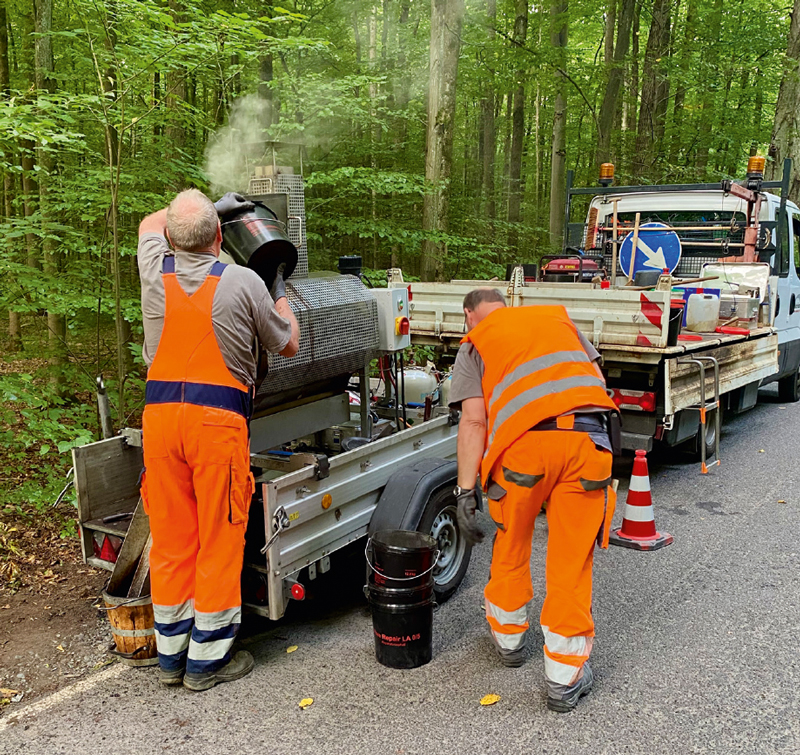The Bremen-based company Carl Ungewitter has specialised in importing natural asphalt and the logistics related to it since it was founded 146 years ago, but also offers transport services for the North African crude oil supply industry and has developed a patented pothole repair system.
Credits: Carl Ungewitter, Andreas Knöbig
“It was ultimately trade with empty petroleum drums that resulted in trade with asphalt,” reported Managing Director Andreas Knöbig, who took over from his father when the latter retired 24 years ago. Many of the written documents from that time went missing during the Second World War. But what is certain is that natural asphalt, which is essential for road construction, has been shipped to Bremen ever since – with exclusive rights, as Carl Ungewitter is responsible for sales throughout the whole of Europe, from the UK to Turkey.
“Natural asphalt is mined and then cleaned in Trinidad,” explained Knöbig. “The raw material, which has the consistency of hard chewing gum, is extracted from natural bitumen and aggregate and then filled into drums on-site. The general importer has around 20 40-foot containers, each filled with 100 hard-fibre drums, that are shipped to Bremen’s industrial docks roughly every five weeks. The journey by sea takes five to six weeks.
At Ungewitter, the drums are opened at the company’s own production facility. Whilst natural asphalt can be mined in Trinidad both in the rainy and dry seasons, it needs to maintain a temperature of at least 5 °C for road construction in Europe, which is why there are very few deliveries to asphalt mixing plants between December and February. “The mass would cool too quickly after heating and could no longer be sufficiently compacted,” explained Knöbig. The peak season in road construction is in September and October.

Patented patching system for pothole repair
The managing director knows all the possible pitfalls because the company has developed its own patching system for repairing potholes, which has since been patented. As the asphalt can be prepared directly on-site, the process of filling potholes is now even faster and more flexible.
A broad focus is also important because company orders are directly dependent on the budgets for work on federal motorways. “If the Federal Ministry for Transport has to postpone projects due to reduced tax revenue, for example, that needs to be compensated for with our other areas of business,” explained Knöbig.
Besides importing, selling and manufacturing goods made from natural asphalt as well as the patching system, this also includes other logistics services associated with sea and air freight. “We have a wide variety of sea freight items,” stated Knöbig. “We handle everything, from food to technology – with clients big and small.”
Business with North Africa originated from normal acquisition activities in the 1980s. “There was a central European purchasing department for Libya in Düsseldorf at that time, which basically resulted in the contact. Transport services for the North African crude oil supply industry have been an important field of business for us ever since,” emphasised Knöbig. Nowadays, most of our customers are state-owned companies and their suppliers.
Specialist knowledge is in demand
“There’s ongoing demand there again as a result of wear and tear and spare parts, which we cover logistically,” the managing director continued. This business is largely conducted via container, as the frequency of breakbulk liner departure has fallen in recent years due to a drop in freight. “Urgent orders are shipped by air to Libya, which is not all that uncommon these days,” added Knöbig.
Detailed knowledge and plenty of experience in fulfilling complex logistics orders are an absolute must, as oil companies in Libya have many special requirements that need to be met. “Consequently, we need to handle our suppliers very meticulously and, more importantly, tailored,” Knöbig emphasised. The ubiquitous lack of specialists poses a challenge, which Carl Ungewitter attempts to counter with employee training. But even that is increasingly difficult, he said. “Up until five years ago, we had eight apprentices. These days, we’ve got one,” said the managing director regretfully.
And that has consequences. “We actually want to develop a new field of business, but haven’t been able to do so because we simply don’t have suitable specialists,” he added. “The situation was really bad two years ago.” But things have improved in freight forwarding since then. What is particularly difficult at present is finding foremen for road construction.
Ungewitter relies, among other things, on degree apprenticeships in collaboration with the German Academy of Foreign Trade and Logistics (DAV), which is also based in Bremen. “Around half of all young professionals take advantage of the programme,” reported the managing director, hoping it will be even more in the future. (cb)

“It was ultimately trade with empty petroleum drums that resulted in trade with asphalt.”
Andreas Knöbig, Managing Director
of Carl Ungewitter in Bremen
Facts
Carl Ungewitter
Established: 1878
Headquarters: Bremen, site in Libya
Employees: 50
Area(s) of business: European general importer
for natural asphalt, logistics services
Turnover in 2023: EUR 38 million






